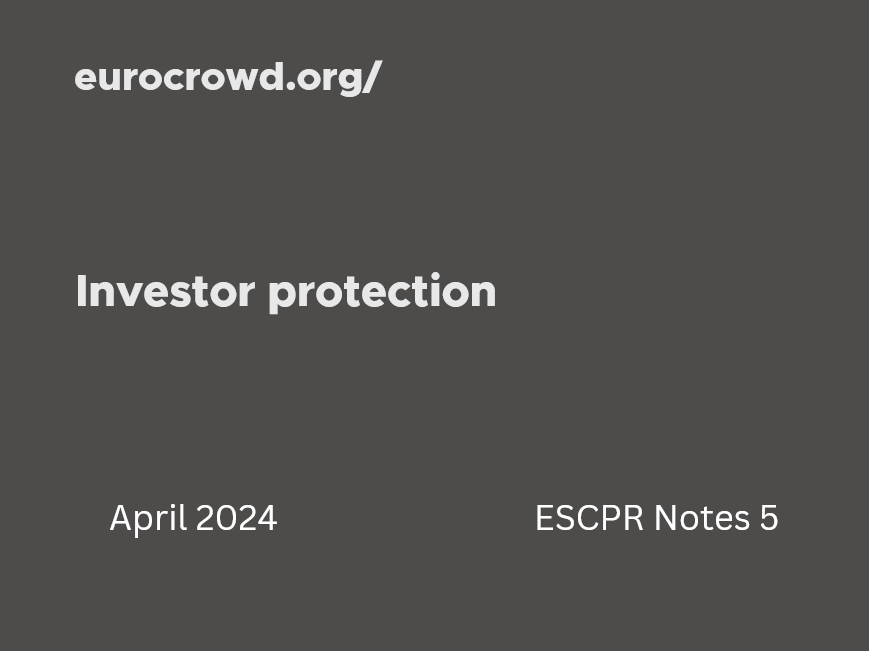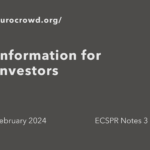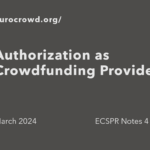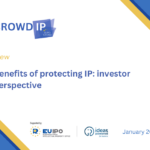ECSPR
Investor protection

If you are a crowdfunding platform, an entrepreneur, or an investor, then you should look this series of articles on the European Crowdfunding Regulation (ECSPR).
The ECSPR is a game-changer. It harmonizes rules across the EU, creating a level playing field for crowdfunding services. In these notes, we break down the jargon, demystify legal intricacies, and provide practical insights.
Today we are going to talk about the information for investors. Crowdfunding platforms act as financial gateways, requiring transparent information to ensure investors make informed decisions, not ones based on hype or hidden risks. Fair and objective presentation safeguards both investor trust and the platform's reputation.
Compliance isn't optional; it's crucial. Be empowered with knowledge with EUROCROWD.
Fifth
Investor protection
We know that one of the objectives of the ECSPR regulation is to protect platform investors. But what specific obligations do crowdfunding service providers have in relation to this?
Definition of investor
Investor means any natural or legal person who, through a crowdfunding platform, grants loans or acquires transferable securities or admitted instruments for crowdfunding purposes.
Within this concept, we can differentiate between sophisticated investors and non-sophisticated investors:
- sophisticated investors: any natural or legal person who is a professional client by virtue of point (1), (2), (3) or (4) of Section I of Annex II to Directive 2014/65/EU or any natural or legal person who has the approval of the crowdfunding service provider to be treated as a sophisticated investor in accordance with the criteria and the procedure laid down in Annex II to ECSPR.
- non-sophisticated investors: investors who are not sophisticated investors.
Highly regulated financial institutions, large companies, government institutions and international organizations or specialized investment entities are considered as professional clients by virtue of Directive 2014/65/EU. On the other hand, Annex II identifies the criteria to consider an investor as sophisticated.
Prohibition of routing investors’ orders
Crowdfunding service providers shall not pay or accept any remuneration, discount or non-monetary benefit for routing investors’ orders to a particular crowdfunding offer made on their crowdfunding platform or to a particular crowdfunding offer made on a third-party crowdfunding platform.
Individual portfolio management of loans
Investors define parameters for their loan portfolio, including risk categories, interest rates, and target returns. In return, crowdfunding platform responsibilities are:
- Use robust processes and data to assess credit risk of individual loans and the investor's overall portfolio.
- Provide investors with a description of their assessment methods.
- Keep records of mandates and loans for 3+ years.
- Provide regular updates on individual portfolios, including loan details, risk measures, performance data, and fees.
- Disclose information about contingency funds (if offered), including risks, policies, and performance.
Conflicts of interest
Crowdfunding platforms cannot participate in projects on their own platform as well as they cannot have shareholders, managers, or related parties as project owners. If they do accept them as investors, full disclosure and equal treatment are required.
Platforms must have internal rules and take steps to prevent, identify, manage, and disclose conflicts of interest. Additionally, general nature and sources of conflicts, along with mitigation steps, must be clearly disclosed on the platform website, on a durable medium (e.g., website) and detailed enough for informed investor decisions.
Information to clients
We talked about this topic on reading 2.
Entry knowledge test
Crowdfunding service providers must assess non-sophisticated investors before granting full access. For this purpose, they need to gather information on past investments, risk understanding, financial situation, and crowdfunding experience. Once this information is gathered, crowdfunding service providers must review assessment every two years and issue risk warnings if investors lack knowledge or have insufficient loss-bearing capacity.
Simulation of the ability to bear loss
- Non sophisticated investors must simulate bearing 10% of their net worth in losses. Platforms review the simulation annually. An acknowledge receiving the simulation results is mandatory.
- Non sophisticated investors are to receive an additional risk warning before investing large amounts and they must explicitly consent and prove understanding of the investment and risks.
Pre-contractual reflection period
Non-sophisticated investors can revoke their investment pledge without penalty within 4 days. Platform informs investors about the reflection period and its details.
Key investment information sheet (KIIS)
Crowdfunding service providers shall provide prospective investors with information concerning risks, fees, etc.
These KIIS must contain investment risks, explanation of potential losses, lack of guarantees, and limited liquidity. They must be offered fair and clear.
Project Owners are responsible for accurate information in KIIS.
Crowdfunding Service Provider are responsible to request information updates from project owner and inform investors of material changes.
Procedures to verify KIIS information are needed, as well as the necessity of addressing omissions and inaccuracies promptly. Provided uncorrected issues, platforms may suspend offers for a max of 30 days and cancel if they are uncorrected after that period.
Other protections
ECSPR includes investors’ protection when crowdfunding service providers allow their clients to advertise interest in buying and selling loans, transferable securities or admitted instruments for crowdfunding purposes that were originally offered on their crowdfunding platforms on bulletin boards.
Finally, investors protection is also considered in case of taking precautionary measures by competent authorities and imposing penalties.
Conclusion
Investor protection is present in the wording of the entire regulation. But it would be a mistake for platforms to consider this protection as a burden. Quite the contrary. European platforms should compete to demonstrate to their potential clients that their platforms are the best treating their investors, in terms of transparency and protection. Otherwise, why would a person invest his money to an entity he does not trust?
Connect with Us: Have questions? Need personalized advice? Reach out: we're here to help!



